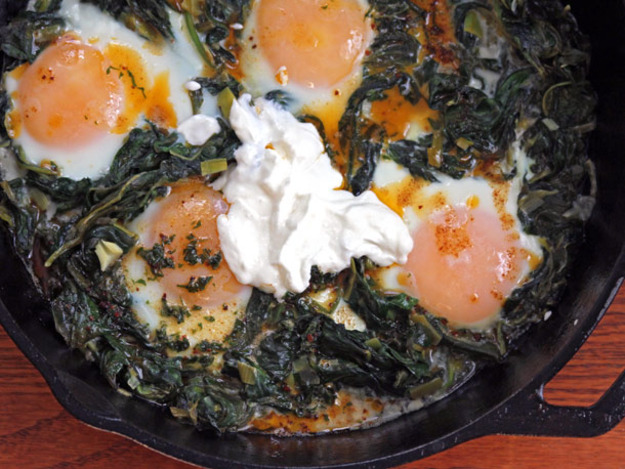Yotam Ottolenghi’s chilli butter recipes

In cooking, as in life outside the kitchen, it’s the small touches that can make a big difference: that final drizzle of olive oil, for example, some finely grated lemon zest, a sprinkle of toasted seeds – those are the little gestures that go a long way to make a dish feel special.
In a similar vein, the addition of a few chilli flakes to melted, slightly browned butter for drizzling over a plate of food is the culinary equivalent of turning up on the doorstep midweek with both arms full of flowers. It makes an instant event of any dish: grilled corn, poached eggs on toast, wilted greens or summer squash soup.
Melting the butter ramps up its flavour, turning it nutty and rich. The chilli dyes it various shades of red and brings with it different degrees of heat, depending on what type you use. Kirmizi biber, a sweet-hot dried red chilli, is especially popular in Turkey, where I learned the art of the chilli butter, though I tend to use aleppo or urfa at home. Aleppo chilli flakes are burgundy in colour and have a medium-sweet heat, whereas urfa are dark crimson, almost black, with a sweet, smoky taste. See what you can find (Middle Eastern food stores and online are especially happy hunting grounds) and experiment: you may prefer to use more or less chilli than I do, depending on your own tastebuds.
Karl’s baked eggs
We often have this when we have guests for Sunday brunch, alongside some good crusty white bread. My husband Karl makes it in a high-sided baking tray that’s as happy on the stove top as it is in the oven; if you don’t have that sort of tray, wilt the leaves in a large, heavy-based pan, then transfer to an ovenproof dish. You can wilt the greens in advance, even the day before, if need be; then, when you want to eat, break in the eggs and bake. Serves six.
3 tbsp olive oil
2 small onions, peeled and chopped into roughly 1cm dice
2 garlic cloves, peeled and crushed
Salt
600g Swiss or rainbow chard, stalks and leaves separated, stalks cut into 1.5cm chunks, leaves roughly chopped
3½ tsp ground cumin
960g baby spinach (ie, 4 240g bags)
300ml chicken (or vegetable) stock
6 large eggs
50g unsalted butter
¾ tsp urfa chilli flakes (or half that if using a different chilli)
250g Greek-style yoghurt
Put the oil, onions, garlic and a quarter-teaspoon of salt in high-sided 20cm x 30cm baking tray, then place the tray across two medium-high flames on the stove top, so the heat gets to all corners of it. Saute for five minutes, stirring from time to time, then add the chopped chard stalks and ground cumin. Saute for another five minutes, until the onion and stalks are translucent, then add the chard leaves and saute for five minutes more, until wilted. Add a quarter of the spinach and half the stock, then stir until the spinach wilts; this will make room in the pan for another quarter of the spinach and the remaining stock. Stir again, until wilted, then add the remaining spinach in two batches.
After about 15 minutes, once all the leaves are wilted, stir in a teaspoon of salt and tip the lot into a large colander with a bowl underneath to collect the liquid. Return the liquid to the tray and, again over two medium-high flames, reduce the liquid for 15 minutes, until there’s about 70ml left. Turn off the heat, stir the leaves into the reduced stock, then make six little indentations in the pile of soft leaves.
Heat the oven to 220C/425F/gas mark 7. Carefully break an egg into each hollow (take care not to break the yolks), then cover the tray tightly with tin foil. Bake for four minutes, remove the foil and bake for eight or so minutes longer, until the whites are almost set and the yolks still runny (the eggs will carry on cooking outside the oven).
While the eggs are baking, melt the butter in a small saucepan on a medium heat for a minute or two, until it starts to foam and turn golden-brown, stir in the urfa chilli and take off the heat.
Take the tray to the table, spoon dollops of yoghurt around the eggs, trickle the butter on top and serve.
Pulled sumac chicken with lemon and yoghurt
This uses oil as the medium for the chilli, rather than butter, though the effect is much the same. Serve just as it is or as part of a meze spread: in both cases, you’ll again need good bread on the side. Serves four.
2 tbsp sumac
4 garlic cloves, peeled and crushed
2 tbsp lemon juice (from 1 lemon)
60ml olive oil
1 tsp aleppo chilli flakes (or ½ tsp if using different chilli), plus ¼ tsp extra to serve
Salt and black pepper
4 chicken thighs, on the bone and skin on
360g Greek-style yoghurt
10g parsley, roughly chopped
In a large bowl, combine the sumac, garlic, lemon juice, oil, chilli, half a tablespoon of salt and a generous grind of black pepper. Add the chicken, rub the mix all over, then cover and refrigerate for at least four hours (or overnight), to marinate.
Heat the oven to 200C/390F/gas mark 6. Lay the chicken skin side up on a 20cm x 30cm oven tray lined with greaseproof paper, making sure it’s spaced well apart, then pour the marinade over the top. Roast for 40 minutes, until the chicken is cooked through and the skin golden-brown. Remove from the oven and separate the skin from the thighs (I use two forks and my fingers); transfer the chicken skin to a second baking tray lined with greaseproof paper. Shred the meat off the bones, which can now be discarded, then cut it into thin strips. Toss the meat in the cooking liquids and keep warm.
Lay a second sheet of greaseproof paper on top of the chicken skin, then weigh it down with another baking tray that fits neatly inside the other. Return to the oven for 10 minutes, to crisp the skin. While it does so, gently warm up the yoghurt in a small saucepan on a low heat for two to three minutes, stirring.
Divide the warm yoghurt between four shallow bowls (or put it in one large bowl), then top with shredded chicken and spiced oil. Thinly slice the crisp skin into long strips and scatter on top, sprinkle with parsley and extra chilli, and serve at once.
Cilbir
This traditional Turkish breakfast is delicious even without the milk crumbs, but I’ve loved them since coming across them at the brilliant Tulum in Melbourne. Bread, however, is a must, for mopping up. Eat this just warm, not piping hot. Serves four.
60g unsalted butter
1 tsp aleppo chilli flakes (or ½ tsp if using another chilli flake)
1 tbsp white-wine vinegar
8 large eggs
320g Greek-style yoghurt
3 garlic cloves, peeled and crushed
2 tsp dill, roughly chopped
Soft Turkish bread (or other good-quality white bread), to serve
Flaky sea salt
For the milk crumbs
50g unsalted butter
25g dried milk powder
⅛ tsp flaky sea salt
To make the milk crumbs, combine 50g butter, the milk powder and an eighth of a teaspoon of flaky salt in a small saucepan. Cook on a low heat for about 10 minutes, stirring constantly so it doesn’t catch, until golden, then spread out on a baking tray lined with kitchen paper and leave to cool. It will set and harden.
Wipe clean the saucepan, then melt 60g butter on a medium heat for a minute or two, until it starts to foam and turn golden-brown. Whisk in the chilli, then take off the heat.
Fill a large bowl with warm water from the tap. Three-quarters fill a large frying pan with water, add the vinegar, bring up to a boil, then turn down the heat to medium-low, so only a few bubbles disturb the surface of the water.
Break the eggs one at a time into a small bowl or ramekin, then carefully tip into the pan. Poach for three minutes, then use a slotted spoon to transfer to the bowl of warm water.
Put the yoghurt, garlic and a quarter-teaspoon of salt in a second small saucepan. On the lowest heat possible, heat the mix through for five minutes, until warm (take care: if it gets too hot, it will split).
To serve, divide the warm yoghurt between four bowls and top each portion with two poached eggs. Spoon over the chilli butter and dill, sprinkle milk crumbs on top and serve with bread for mopping.
[“source-theguardian”]




